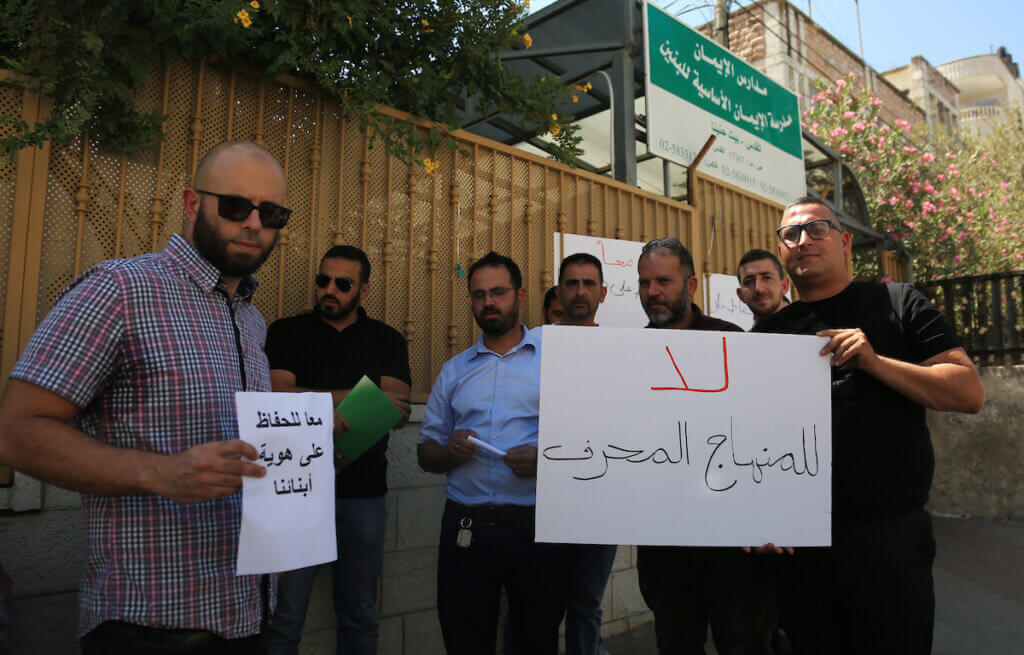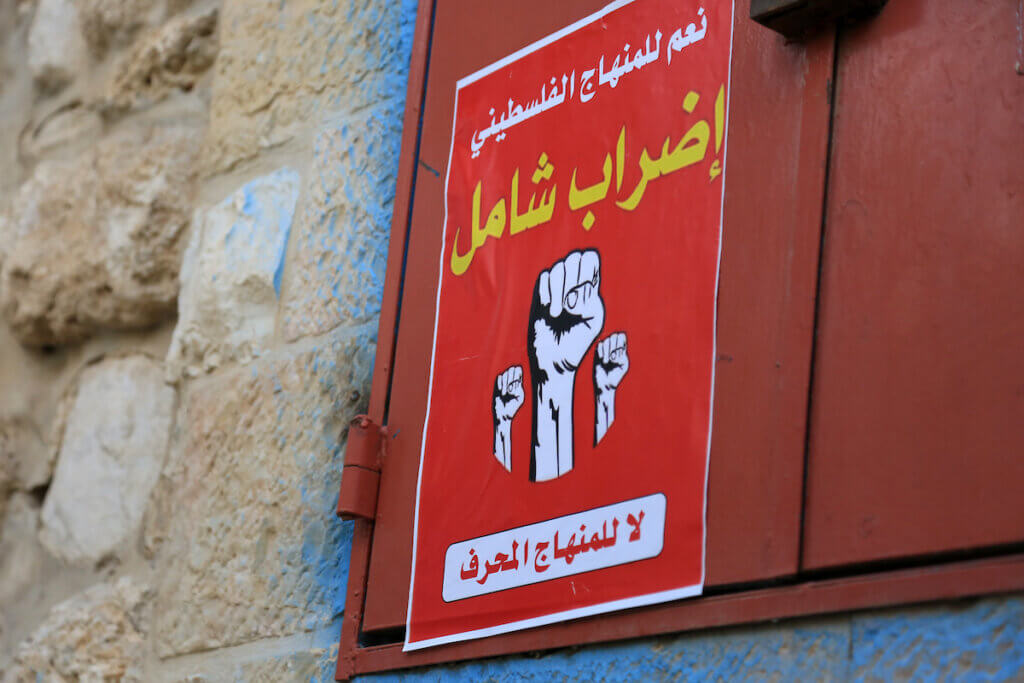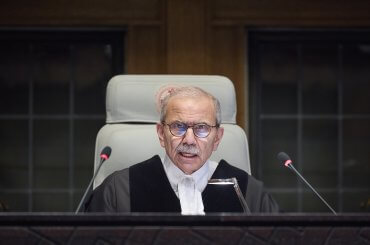Christopher Karam knows there’s a subject he legally can’t bring up to his students. As a teacher at Tamrat El Zeitoun Waldorf school in Shefa-Amr, about 20 minutes north of Haifa in the Galilee, he finds under-the-radar ways to educate kids about a topic the Israeli government has banned: the Nakba.
“It feels weird every time I say it’s illegal,” he said. “It puts you in a really tight space, you have to be smart about how you talk about it.”
Karam grew up in Nazareth, where he attended an Arab-run private school, and said he learned much more about his culture and history outside of school. As a teacher now, he uses culture to get around the law, he said, which might be a way to indirectly introduce his Palestinian students to their community. The Nakba, the Arabic word for the expulsion of 700,000 Palestinians from the region in 1948, often comes up in poems and songs, for example.
He might also wait for students to bring it up on their own, he said, and then encourage them to deepen their engagement with the topic. But even with these work-arounds, some parents — even those of Palestinians with Israeli citizenship — have occasionally come in and complained, arguing that “this is Israel,” not Palestine.
“In the end, we’re learning their history, not ours.”
Christopher Karam
“It’s important for me to help guide them,” Karam said of the students, pointing out that social media can be filled with misleading or fake information that promotes a whitewashed Zionist narrative. “In the end, we’re learning their history, not ours.”
The tightrope walked by teachers like Karam and their students highlights a key issue facing the education of students inside Israeli-funded schools, even if they are in Palestinian communities.
The issue has become a key focus in Palestine this year as community members have organized to challenge the Israeli government’s discriminatory policies targeting them in Jaffa, Jerusalem and across the region. The issues can range from lack of infrastructure to censorship and present parents with a complicated environment to navigate.
Systemic discrimination
In April, Adalah, a legal NGO in Haifa focused on Palestinian rights in the region, filed a petition in an Israeli court against a policy that banned schools and third-party contractors from acknowledging the Nakba. In early September, residents in Jaffa joined to protest the closure of kindergartens, while teachers last week in East Jerusalem observed a strike against the Israeli municipality’s attempts to censor their textbooks.
The Israeli government has a history of undermining Palestinian education. Whether it’s refusing to provide buses for Bedouin children in the Naqab or failing to provide matriculation exams in Arabic until 2019 legal organizations have routinely had to fight for full rights within schools.
Inside the 1948 borders of Palestine, the disparity between wealthy Israeli cities like Petah Tikva or Caesarea against their poorer neighboring Arab towns is particularly stark. This can take the form of a family’s pure ability to pay for schooling, Karam pointed out, saying that private schools in Jewish Israeli communities are often more expensive and therefore better equipped to support their students.
The discrimination occurs in public schools, too, though. Hebrew media and lawmakers have recognized this dichotomy for years: in 2016, one finance ministry report on funding discrimination against Palestinian communities found that school budgets are one of the first forms of financial discrimination Arabs in historic Palestine might face.
“The discrimination is so sweeping, broad and widespread that there is no choice but to admit that it [exists],” wrote the Haaretz-owned site TheMarker while reporting on the government’s findings, pointing out how Israeli politicians routinely deny existence of a disparity. “The discrimination starts first of all in the education budgets, and does not leave an Arab child in the State of Israel a chance to reduce the gaps between him and a Jewish child.”
The report went on to find that the number of Palestinian students dropping out of school before finishing high school was 50 percent higher than Jewish Israeli students. At the same time, Palestinian schools were largely facing physical limitations: classes were taught out of trailers rather than real classrooms, and even if they were built as classrooms, they might be packed full of students. And even though the Ministry of Education had been diverting funding toward Arab schools to try to make up for some of these gaps, according to the report, each Palestinian student received 95% less in aid from the government than Ultra Orthodox Jewish Israeli students.
In January 2022, Israeli lawmakers made a similar claim that they would divert money from the education budget to Palestinian schools — even including “for the first time,” according to Haaretz — instruction in Palestinian identity.
In the past few years, as international pressure has ramped up on the Israeli government against its apartheid practices, lawmakers have responded by announcing plans that appear to support Arab communities but actually amount to victim-blaming. In 2021, after Israeli police, military and citizens responded to Palestinian-led protests with extreme violence, the government argued that the real problem was Arab crime — a problem they intended to solve with increased policing.
The news about increased instruction around Palestinian identity was automatically undermined by the Ministry of Education’s own policies preventing schools and third-party vendors from discussing the Nakba. In a bulletin sent to schools in March 2022, the ministry suggested that acknowledgment of the Nakba was “support for terrorism.”
The ministry’s decision followed an attempt to open up flexibility for schools to work with private education vendors without written approval from the ministry. To achieve this, they created a database of approved education providers and created a document that would stipulate the provider acknowledges Israel as a Jewish and democratic state, and bars discussion of the Nakba.
“This document that the provider must sign, it doesn’t really say what mentioning what the Nakba is,” said Salam Irsheid, an attorney with Adalah who led the petition against the education ministry’s policy. She explained that because the decision was left vague, education providers could be found in violation indirectly.
The ministry fought Irsheid’s petition on a number of technicalities, she said, like arguing that they weren’t given enough time to respond in court or that it was filed incorrectly. But even the judge found that the declaration barring discussion of the Nakba was too broad and impossible to implement, Irsheid said, because no one can know how broadly it should be applied.
For example, the document requires outside speakers for classes to be vetted for prior statements that may acknowledge the Nakba. But Irsheid said schools have no way of knowing how far back they should look into a speaker’s history.
“From the answers of the ministry, it’s still not clear,” she said. “Discrimination is really everywhere.”

Exacerbating tensions
In Jaffa, organizers are pushing back against policies designed to erase their community, they said. Abed Abu-Shehadeh, a former municipal representative and activist from the city, said he helped put together this month’s marches against the closure of local kindergartens and these broader discriminatory practices because he felt the Tel Aviv government was ignoring Palestinians.
“The policies the municipality has in Yaffa is leading to the loss of our native tongue,” he said. “There’s an inherent problem with the policies… are we part of the planning or not?”
About a week later, Israeli parents in the neighboring city of Holon protested a kindergarten simply because some of the teachers were Palestinian from East Jerusalem. These protests led the workers to resign. In defending the Arab teachers, liberal Israeli parents argued that supposedly “mixed” cities like Jaffa are beneficial because they celebrate diversity, but failed to acknowledge the power imbalance between the communities and resources available to students.
Meanwhile, in East Jerusalem, schools remained closed last week to protest imposed Israeli-approved textbooks that sanitize the history of Zionism. This came after Israeli authorities canceled the licenses of six Palestinian schools in the city claiming their textbooks incited violence.
For Karam, the balance between state-level policies and everyday experiences for his students can be complicated to contain. He explained that navigating the environment as a Palestinian inside Israeli society can mean some embrace a state that is hostile to them, because it is easier.
On top of that, he said, the government actually exacerbates tensions within the community by cramming together non-Jewish communities as if they were a monolithic group. So schools with Muslim, Christian and Druze students can be forced to balance conflicting rules from each group, like whether music is allowed to be taught.
“Israel and the government has done a very good job of separating Arabs from each other,” he said.



But the article doesn’t say anything about the legality of teaching the Naksa!
https://www.middleeastmonitor.com/20220605-remembering-the-naksa/
Remembering the Naksa…Nearly 400,000 Palestinians were added to the hundreds of thousands of refugees displaced in 1948 and their homes and villages were razed to the ground by the Israelis. Around half were being displaced for the second time in less than 20 years. Israel’s ethnic cleansing of Palestine was ongoing (as it is to this day)….The number of Palestinian refugees in the camps operated by the UN Relief and Works Agency (UNRWA) in the West Bank, Gaza Strip, Jordan, Syria and Lebanon grew.
1 of 2″Palestinians push back against Israeli government discrimination in education. Palestinians in Jaffa, Jerusalem, & across Israel are challenging discriminatory Israeli education policies.”Related:
https://al-awda.org/on-israels-little-known-concentration-and-labor-camps-in-1948-1955/
“On Israel’s little-known concentration and labor camps in 1948-1955” Oct 19, 2014 | Articles & Features
EXCERPT:
“It is shocking that this would have happened in Palestine within just a few years after the Nazi regime was defeated & all the prisoners including the large number of Jews in their concentration camps were freed.
“The following article by Yazan al-Saadi was published in Alakhbar on Monday, September 29, 2014.
“Much of the grim & murky circumstances of the Zionist ethnic cleansing of Palestinians in the late 1940s have gradually been exposed over time. One aspect – rarely researched or deeply discussed – is the internment of thousands of Palestinian civilians within at least 22 Zionist-run concentration & labor camps that existed from 1948 to 1955. Now more is known about the contours of this historical crime, due to the comprehensive research by renowned Palestinian historian Salman Abu Sitta & founding member of the Palestinian resource center BADIL, Terry Rempel.
“The study – to be published in the upcoming issue of the Journal of Palestine Studies – relies on almost 500 pages of International Committee of the Red Cross’s (ICRC) reports written during the 1948 war, that were declassified & made available to the public in 1996, & accidentally discovered by one of the authors in 1999.
“Furthermore, testimonies of 22 former Palestinian civilian detainees of these camps were collected by the authors, through interviews they conducted themselves in 2002, or documented by others during different moments of time.
“With these sources of information, the authors, as they put it, pieced together a clearer story of how Israel captured & imprisoned ‘thousands of Palestinian civilians as forced laborers,’ & exploited them ‘to support its war-time economy.’
“Digging up the crimes”
“I came across this piece of history in the 1990s when I was collecting material & documents about Palestinians,’ Abu Sitta told Al-Akhbar English. ‘The more & more you dig, the more you find there are crimes that have taken place that are not reported & not known.’ (cont’d)
2 of 2
“At that time, Abu Sitta went to Geneva to check out the newly-opened archives of the ICRC. According to him, the archives were opened to the public after accusations that the ICRC had sided with the Nazis during World War II. It was an opportunity that he could not miss in terms of seeing what the ICRC had recorded of the events that occurred in Palestine in 1948. It was there he stumbled onto records discussing the existence of 5 concentration camps run by the Israelis.
“He then decided to look for witnesses or former detainees, interviewing Palestinians in occupied Palestine, Syria, & Jordan.
“’They all described the same story, & their real experience in these camps,’ he said.
“One question that immediately struck him was why there was barely any references in history about these camps, especially when it became clearer the more he researched that they existed, & were more than just 5 camps.
’Many former Palestinian detainees saw the concept of Israel as a vicious enemy, so they thought their experience labouring in these concentration camps was nothing in comparison to the other larger tragedy of the Nakba. ‘The Nakba overshadowed everything,’ Abu Sitta explained.
’However, when I dug into the period 1948-1955, I found more references like Mohammed Nimr al-Khatib, an imam in Haifa, who had written down interviews with someone from the al-Yahya family that was in one of the camps. I was able to trace this man all the way to California & spoke with him in 2002,’ he added.
“More references were eventually & slowly discovered by Abu Sitta including information from a Jewish woman called Janoud, a single masters thesis in Hebrew University about the topic, & the personal accounts of economist Yusif Sayigh, helped to further flesh out the scale & nature of these camps. “After more than a decade, Abu Sitta, with his co-author Rempel, are finally presenting their findings to the public.”
re-writing history is a part of ethnic cleansing. Give the people no history and who cares if they have no future?